Man Without a Star Blu-ray Movie
HomeMan Without a Star Blu-ray Movie 
Kino Lorber | 1955 | 89 min | Not rated | Aug 27, 2019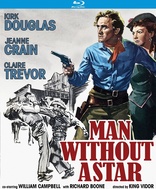
Price
List price:Amazon: $14.99 (Save 9%)
Third party: $14.99 (Save 9%)
Only 10 left in stock (more on the way).
Movie rating
7.1 | / 10 |
Blu-ray rating
| Users | 0.0 | |
| Reviewer | 3.5 | |
| Overall | 3.5 |
Overview
Man Without a Star (1955)
Dempsey Rae, a cowboy with no clear aim in life, winds up working on a spread with a hard lady owner just arrived from the East.
Starring: Kirk Douglas, Jeanne Crain, Claire Trevor, William Campbell (I), Richard Boone (I)Director: King Vidor
| Western | 100% |
Specifications
Video
Video codec: MPEG-4 AVC
Video resolution: 1080p
Aspect ratio: 2.00:1
Original aspect ratio: 2.00:1
Audio
English: DTS-HD Master Audio 2.0 Mono (48kHz, 16-bit)
Subtitles
English SDH
Discs
Blu-ray Disc
Single disc (1 BD)
Playback
Region A (locked)
Review
Rating summary
| Movie | 3.5 | |
| Video | 3.5 | |
| Audio | 4.5 | |
| Extras | 2.0 | |
| Overall | 3.5 |
Man Without a Star Blu-ray Movie Review
Reviewed by Dr. Svet Atanasov August 21, 2022King Vidor's "Man Without a Star" (1955) arrives on Blu-ray courtesy of Kino Lorber. The supplemental features on the release include exclusive new audio commentary by film historian Toby Roan and and vintage trailer for the film. In English, with optional English SDH subtitles for the main feature. Region-A "locked".
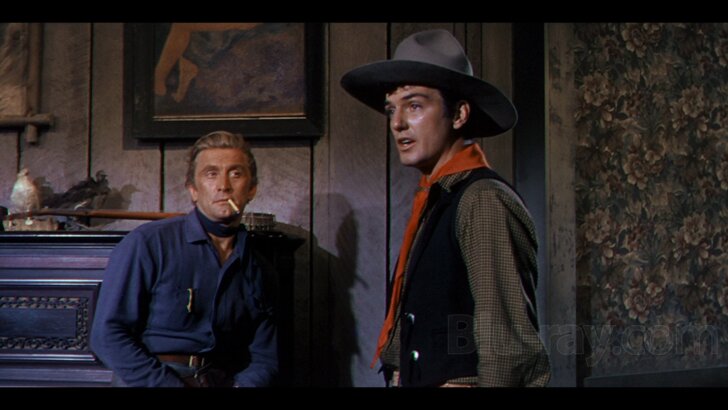
Man Without a Star is an unusual western. It was made by a legendary director who worked with a legendary cinematographer. It has one of old Hollywood’s greatest stars, in his prime, surrounded by a terrific supporting cast. It was produced by a man who had a history of delivering very big, now considered classic westerns. However, Man Without a Star looks like a pretty small, almost intimate project that was done very quickly and with a surprisingly modest budget.
The director is King Vidor, who won an Oscar statuette with War and Peace (1956) and made the excellent Duel in the Sun (1946), Texas Rangers (1936), and Billy the Kid (1930). Vidor worked with a screenplay that adapted original material from a not-so-well-known novel written by Dee Lenford. However, the two writers that adapted the novel were amongst the best in the business: Borden Chase, who reworked his original story for the iconic Red River (1948), and D.D. Beauchamp, who scripted multiple episodes for the popular Wanted: Dead or Alive (1958-1961) TV series. The big star is Kirk Douglas, who had already done Ace in the Hole (1951) and The Bad and the Beautiful (1952), and was surrounded by the likes of Richard Boone, Jay C. Flippen, George Wallace, Claire Trevor, and Jeanne Crain. The legendary cinematographer is Russell Metty, whose credits feature such iconic films as Touch of Evil (1958) and Spartacus (1960). The man who hired Vidor was Aaron Rosenberg and he had already delivered Winchester ‘73 (1950) and Bend of the River (1952).
It is an impressive gathering of all types of different talent, isn’t it? And with such diverse talent, one should rightfully expect Man Without a Star to be a pretty big film, correct?
My very first viewing of Man Without a Star occurred just a few weeks ago and this is precisely the type of expectation I had. After seeing Vidor and Douglas’ names attached to it, I scanned the rest of the cast and looked up the name of the man that had operated the camera, so mentally I was prepared for a grand story and equally impressive visuals. However, Man Without a Star surprised me in so many ways that my experience with it was almost as strange as the one I had when I first viewed Johnny Guitar (1954). Before I describe some of the ways in which Man Without a Star surprised me, however, here’s a quick summation of its plot:
Texas cowboy Dempsey Rae (Douglas) travels on a freight train bound for Wyoming where he hopes to get employed as a cattle herder. On the train, Rae bumps into Jeff Jimson (William Campbell), a young drifter who wants to be like him, and saves his life. Later on, the two end up at the ranch of Reed Bowman (Crain), a very pragmatic and unusually tough lady from back East, who employs them and then casually begins flirting with them. For a while, the three enjoy the romantic game, but when Bowman’s growing herds become too big and she clashes with other ranchers who have divided the area’s fertile land, Rae and Jimson are forced to rethink their commitment to Bowman. While they do, violence erupts and they become enemies.
The entire first half and a small portion of the second half create the impression that Man Without a Star would be a lighthearted western that mixes well comedy and romance. For example, Douglas never misses a chance to be cheeky and while in the local saloon frequently grabs a banjo as if to prove that the Old West knew how to party hard. (Douglas holds the banjo like an ax and his singing is awful, so he isn’t fooling anyone that his character is a great showman, but it is the enthusiasm and energy that count). Campbell is the typical rookie whose inexperience almost daily makes him look quite silly, so each new ‘lesson’ is usually a hilarious situation as well. But once the ranchers clash, Vidor quite dramatically resets all major relationships and the tone of the film. As a result, the previous image of the Old West is effectively destroyed.
But this shift also hurts the integrity of the key characters. Indeed, Douglas’s past with barbwire suddenly becomes a major theme and demands that he reveals a stronger, more uncompromising side of his character that at very least feels underdeveloped. Campbell then suddenly acquires the macho personality that feels entirely scripted. And some of the supporting actors become classic meanies that somehow managed to behave properly until it was time for Douglas’ crucial transformation.
The highlight of Man Without a Star is a giant, brilliantly filmed stampede in the middle of which Douglas guns down a couple of opponents.
Man Without a Star Blu-ray Movie, Video Quality 
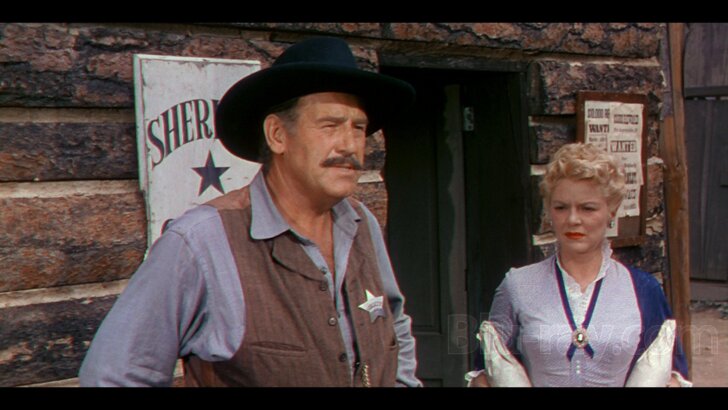
Presented in an aspect ratio of 2.00:1, encoded with MPEG-4 AVC and granted a 1080p transfer, Man Without a Star arrives on Blu-ray courtesy of Criterion.
Kino's release is sourced from the same master British label Eureka Entertainment worked with to produce this Region-B release. This is an older master that was supplied by Universal Pictures.
My take on this master is that its biggest weakness is its age. Why? Because I don't see any traces of troubling digital corrections, and because virtually all of the inconsistencies that are present on the visuals are inherited. For example, there are plenty of close-ups that look quite good, even some larger shots, but elsewhere there are registration issues and flatness that are replicated. Colors are stable, but the primaries and supporting
nuances can be improved. But even in the area of color reproduction, I don't see any purely technical issues; rather, it is pretty obvious to me that the element that was used to create the current master wasn't optimal. Image stability is good, but some shaky transitions remain. There are no large cuts, damage marks, warped or torn frames, but a few nicks and blemishes can be spotted. My score is 3.25/5.00. (Note: This is a Region-A "locked" Blu-ray release. Therefore, you must have a native Region-A or Region-Free player in order to access its content).
Man Without a Star Blu-ray Movie, Audio Quality 
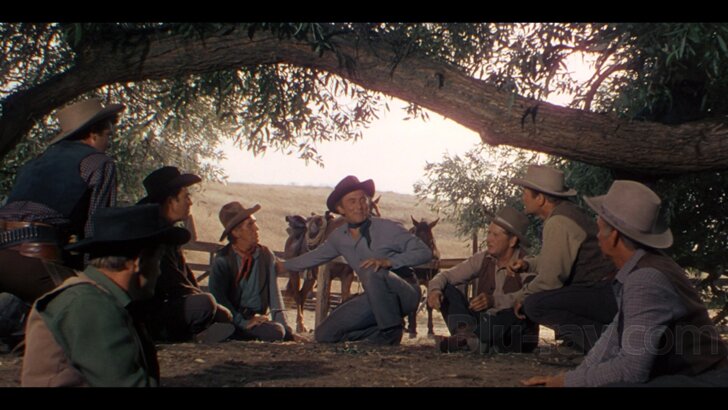
There is only one standard audio track on this Blu-ray release: English DTS-HD Master Audio 2.0. Optional English SDH subtitles are provided for the main feature.
Unlike the video, the audio is surprisingly strong. Excluding some very minor sporadic unevenness, the audio sounds very sharp, clear, and most importantly very healthy. Indeed, even if you turn up the volume of your system quite a lot, as I did, you won't notice any troubling age-related imperfections.
Man Without a Star Blu-ray Movie, Special Features and Extras 
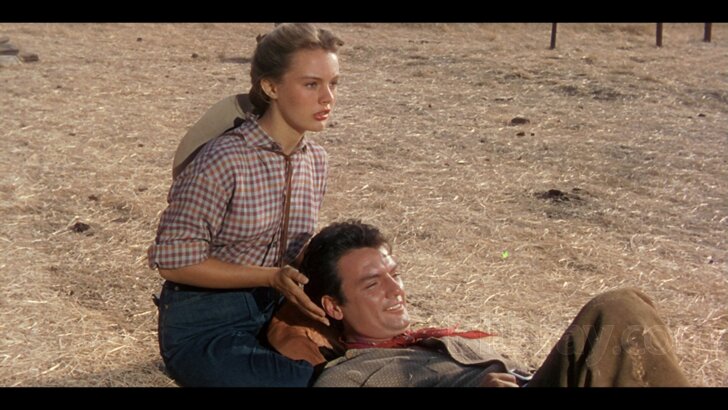
- Trailer - an vintage trailer for Man Without a Star. In English, not subtitled. (1 min).
- Commentary - this exclusive new audio commentary was recorded by film historian Toby Roan. It is a very strong commentary with seemingly endless information about the people that made Man Without a Star and their careers, the era in which the film was greenlighted, and the western genre. Mr. Roan also draws some interesting comparisons between Man Without a Star and other westerns/films that I found quite interesting. I enjoyed the commentary a lot.
Man Without a Star Blu-ray Movie, Overall Score and Recommendation 
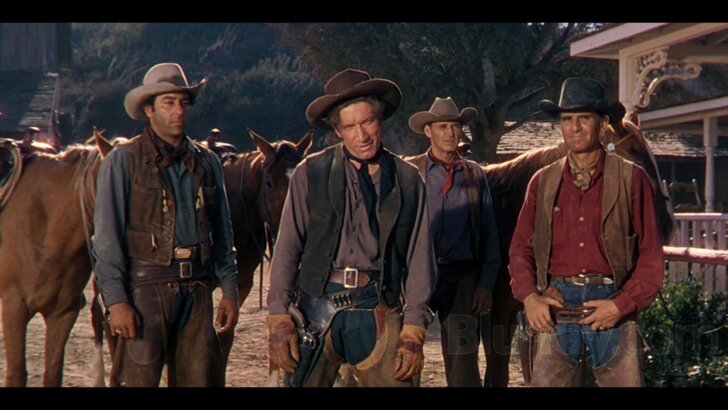
My first viewing of Man Without a Star materialized with this release a few weeks ago. The film surprised me a lot because it did not turn out to be an old-fashioned western with powerful performances and grand visuals. (The stampede looks great, but I expected a lot more). There is a tiny subversive element in it, one that is very difficult to properly define, which produces a string of unusual developments and character transformations. Some work quite well, but some feel underdeveloped, so I am unsure what was the original intent for it. I think that it works, but it is hard to ignore the strange fact that a pretty large group of incredibly talented people were brought in to do it and yet the end product feels very modest. Needless to say, the speculator in me is pretty confident that in 1955 producer Aaron Rosenberg and Universal International weren't too happy with it. Kino Lorber's release is sourced from an older but mostly decent master. RECOMMENDED.
Similar titles
Similar titles you might also like

Warlock
Limited Edition to 3000
1959

The Big Country
1958

The Outsider
2019

The Ballad of Lefty Brown
2017

The Spikes Gang
1974

Captain Apache
1971

Tomahawk
1951

Barbarosa
1982

The Man from the Alamo
1953

Man with the Gun
1955

The Fastest Gun Alive
Warner Archive Collection
1956

Doc
1971

The White Buffalo
2K Restoration
1977

More Dead Than Alive
1969

The Last Hunt
1956

The Cimarron Kid
1952

No Name on the Bullet
1959

The Stalking Moon
Warner Archive Collection
1968

Monte Walsh
Special Edition
1970

Cheyenne: The Complete Series
Warner Archive Collection
1955-1962